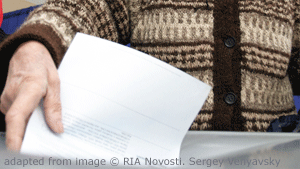Elections: a tale of two Russias

file photo of random Russian television studio"Uniformed police presence discourages troublemakers," "Get the monitors and journalists' cell phone numbers and ensure a constant stream of calls to them," "Ask the monitors to leave on any pretext," and finally "Keep a table set all the time with a supply of tea and alcohol."
These bizarre recommendations in writing came arrived at Kommersant FM, the radio station I work for in Moscow. They were written for the staff of one of the district electoral commissions in the Russian capital in the run-up to the State Duma elections, which are to be held on December 4th. Election monitors from political parties and journalists who, according to Russian law adopted in the 1990s, have free access at any venue during the voting and counting are viewed by the commissions, i.e. the authorities themselves, as "troublemakers" to be prevented from doing what they are supposed to do: ensuring a transparent, fair and free election process.
The authorities did not even react to my radio's revelations despite the fact that even issuing such and instruction is a gross violation of the constitution. And even if a member of the district electoral commission is caught red-handed implementing the recommendations, I cited, he or she would be ... just fined an equivalent of $50. That's a pretty good deal for rigging Russia's basic law.
Russia's general elections campaign is entering its last hours. It is clear by now that the results will be massively rigged by the authorities to ensure that United Russia gets on top with a massive majority in the Duma, possibly a two-thirds domination that ensures the ability to change the constitution. So is Russia standing still and does it want stability? Or is it restless and wants change?
Actually it acts both ways. What we are witnessing is an unfolding story of two Russias: one urban, not necessarily well-educated but industrious and appreciating knowledge, internet-connected, probably uncertain of what it wants but definitely tired of the enforced "Putin consensus" of the last ten-twelve years. These people are not the perfect middle class liberals of the future. They are the irritated products of the oil boom that collapsed, looking for a meaning to their lives.
Another Russia is the country of ... you expect me to say that it is a land of pensioners, small-time civil servants and army officers that expect the 'Putinistas' to give them an extra 1,000 rubles to their pensions or salaries? Yes, they are. But they are much more than that. These people are instinctively suspicious of any change. They worship the state's power because they have none of their own. They dislike Moscow and St. Petersburg "burgers" because they never managed to make it to the shining lights of the metropolises. They know that things may not be right under what could be rightly termed Russia's "ancient regime." But they prefer it to a change that will be lead by those that "made it" in life, as opposed to themselves who did not.
Anti-Western sentiment plays a role here. More than a decade of relentless government propaganda left their mark. These sentiments are pretty much widely spread even among those who do not count themselves among the fans of the prime minister. Quite a lot of the opposition to the Kremlin comes from those who claim that Putin was not anti-Western or anti-American enough.
The December 4th Duma elections as well as the March presidential ones will be the last ones the Kremlin will be able to control. I am certain that next comes a period of growing unrest and confusion, in which the two Russias I described will be jostling to control the future of the country. Predictions here are a messy and risky business, but I'd venture one: stability, that in Russia was precarious even in the best of times, is over.

